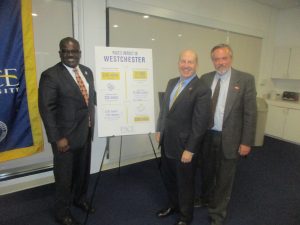Study: Pace Pumped $360M into Westchester Economy

Pace University just doesn’t enable thousands of students to earn college degrees, it’s also an economic powerhouse for Westchester County.
The university Monday released a recently completed economic analysis showing that it contributed nearly $360 million into Westchester in 2017. The study, prepared by The Helene T. and Grant M. Wilson Center for Social Entrepreneurship at Pace, evaluated a multitude of factors including payroll, construction, procurement along with student and visitor spending on meals, entertainment, transportation and local retail.
Although the university does not pay taxes, its positive impact on the surrounding community and the entire county has been significant, said Pace President Marvin Krislov.
“I think the takeaway is Pace is an economic engine, and like other nonprofits, we contribute to the community by employing people who will spend money,” Krislov said. “There’s a lot of direct economic benefits and some indirect benefits as well.”
There are more than 4,300 students and over 1,500 employees at Pace’s two Westchester campuses – in Pleasantville and at the Elisabeth Haub School of Law in White Plains, Krislov noted. Other key statistics revealed that students in Pleasantville alone spent $24.3 million on off-campus food, housing entertainment and retail. Including the law school, that number jumped to $35 million in 2017.
Furthermore, sporting events drew more than 142,000 people, who spent another $5.4 million at restaurants, hotels and retail shops.
Deputy County Executive Ken Jenkins, who joined Krislov and Pleasantville Mayor Peter Scherer for the announcement of the study’s results at the Pleasantville campus, said Westchester is fortunate to have an impressive list of colleges and universities that not only play a critical role in educating the next generation but in bringing economic benefits and vitality to the area.
“It shows again how much that value, that investment makes,” Jenkins said.
In the past five years, Pace has invested $293 million in its two Westchester campuses, including completion in 2017 of the construction of new dorms and student learning spaces, an expanded student center and enhanced sports facilities in Pleasantville, Krislov said.
While the university is just outside the village’s borders, it helps Pleasantville and the Town of Mount Pleasant, Scherer said. He referred to a board propped on an easel displaying the key statistics from the report, calling it the best advertisement for having a quality nonprofit or non-taxpaying entity in the village’s midst.
“We are fortunate in this community to be enriched with education, with healthcare, with parks and preserves and not-for-profit organizations enhancing the life that we already have here,” Scherer said.
An indirect non-financial benefit for Westchester is that Pace students contribute 21,000 hours of volunteer community service to local organizations each year, Krislov said.
He said that Pace also completed the same study for its Manhattan campus. Combined with Westchester, the university generates roughly $1 billion in economic activity.
Like any institution of higher learning, Pace helps students achieve successful lives and careers, Krislov said, but it also plays an important role in bringing jobs and spending to the area.
“I think it’s important to see how we’re doing, to measure what we’re doing, and also for our external stakeholders to understand what our influences is and what our impact is,” Krislov said of the purpose behind the study. “But I also think it helps us think about the role that the university plays in the life of the community, in this case Westchester.”
He and Scherer both expressed optimism that there can be an even greater partnership between the local community and the university.
“I think there are more opportunities, not just sports events and cultural events, but also potentially a lecture and something educational, community stuff or just an opportunity to see what’s going on on this campus,” Scherer mentioned. “I think there’s lots of potential there and it would please me to think that over time Pleasantville felt like a college town.”

Martin has more than 30 years experience covering local news in Westchester and Putnam counties, including a frequent focus on zoning and planning issues. He has been editor-in-chief of The Examiner since its inception in 2007. Read more from Martin’s editor-author bio here. Read Martin’s archived work here: https://www.theexaminernews.com/author/martin-wilbur2007/
